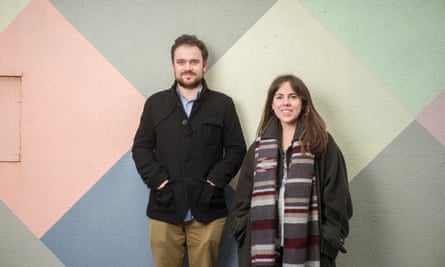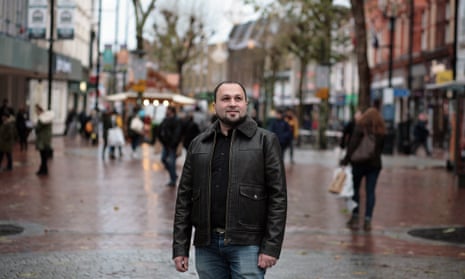Hussam Allahham knows how to save a life on the operating table. He has done it many times in his home city of Damascus. He can fix broken limbs, amputate, remove tumours and replace organs. As a general surgeon he has had plenty of practice with a scalpel and stitches, both in Syria and while in a refugee camp in Italy.
In short, he’d be a useful addition to a health service anywhere. Only, in his new adopted home of Cardiff, Allahham, 36, cannot practise. He has tried to regain his standing as a surgeon but prohibitively expensive language tests and requalification exams have prevented him.
His story is one that is commonly retold in different forms among the refugee population: 38% of the 10,000-plus Syrian refugees in the UK have a university education, yet 70% of all refugees are unemployed and 20% have had to change their careers to take any available job.
Theresa May’s government has pledged to resettle 20,000 Syrian refugees by 2020 – supposedly the largest single response to a humanitarian crisis by a British government. But a large section of this refugee population is being denied the ability to work to their full potential. Just as underemployment, the imbalance between skills and job roles, has reached double the rate of unemployment for British citizens, the same issues are affecting Britain’s refugees. And despite May’s stated intention being to prioritise immigration for the highly skilled after Brexit, here is an underutilised source of skilled people who are already in the country.
Fortunately, a cluster of social enterprises have formed to help address these worrying statistics. With many based in London, and some even sharing the same co-working spaces, these startups help refugee talent move from unemployment or underemployment into meaningful work.
“When I first arrived in the UK as an asylum seeker, I wasn’t allowed to work at all and it was very hard for me to accept benefits,” Allahham says. These benefits of £5 per day had to sustain Allahham for the four months it took for his application to be approved. “I used to be a doctor, with a high standing in Syria,” he continues, “so it was humiliating to go to the jobcentre and ask for money. They didn’t care that I am a doctor and can contribute to the country. I had to find any work.” Allahham took their advice. “Even cleaning was better than seeking benefits,” he says.
After volunteering at a local community centre, Allahham secured a full-time role as a support worker for asylum seekers. With this stability, he could focus on passing the International English Language Testing System (IELTS) exam to requalify as a surgeon. Nine attempts and £3,500 in exam fees later, Allahham still works at the community centre.
“The main problem is that I had to work full-time while studying for the language test,” he says, “and the free classes, which it took over an hour to walk to each day, weren’t going to help me to get the high scores I needed.” This high score of level 7.5 for medicine – where an average native speaker would likely reach 5 – requires intensive coaching, with one term costing upwards of £3,000.
Trapped in this cycle, Allahham found help through the charity RefuAid. Started in 2015 by ex-law trainee Anna Jones and consultant Tamsyn Brewster, RefuAid provides free language courses at 74 partner schools in the UK, as well as interest-free loans of up to £10,000 for refugees to requalify.
“Language is the absolute first step to integration,” Jones says, “and since we started we haven’t had a single default on the £215,000 we’ve loaned, while we’ve also placed 143 refugees into language schools.” Jones estimates it takes at least a year of full-time study to pass the IELTS, since “the level of language they need is absurd”. She says that means there are “thousands of qualified refugees available who are misjudged and misused”.
With RefuAid’s help, Allahham is now focusing on passing a new language test, the medically focused Occupational English Test, and once he does he will apply for a loan to take the £2,500 exam to requalify as a surgeon. “It’s a long road ahead, but I’m sure I will work again as a doctor and help my community,” he says.
ProfileHow do you get asylum in the UK?
Show
How many people apply for asylum?
In 2016, there were 30,747 applications for asylum in the UK. Of the applications decided in 2016, 34% were initially granted asylum or another protection visa.
What is the process?
Firstly, a short, screening interview is conducted with the applicant, to obtain basic details about the person and their claim.
Next, the person will have their main interview with the Home Office, which tries to deal with straightforward cases within six months, although some people wait for more than a year.
Finally, a caseworker will decide on the person's need for protection based on their interview, supporting documents, and the Home Office's country guidance about the applicant's country of origin.
What is the main interview like?
The asylum seeker will usually be interviewed at one of 12 regional casework units by a Home Office representative, with an interpreter present if needed.
During the interview, the applicant will be asked why they are seeking asylum and about their journey to the UK.
How important is the interview?
Incredibly so. The transcript, which is written by the Home Office representative during the interview, becomes the main record of the claim. People are often refused asylum on the basis that there were inconsistencies in their interview, or between their main and screening interviews, which the Home Office will say undermines the person's credibility. The transcript is also used heavily if the claim is refused and goes to appeal.
Miranda Butler, a barrister at 3 Hare Court Chambers in London, calls the interview a "totemic piece of evidence. It’s their chance to tell their story. You’ve got to give your claim in a watertight fashion … It’s very difficult to change your account afterwards and if you do people will assume you’re lying.”
What happens after that?
If someone is granted refugee status or another protection visa, they have the right to live and work in the UK and may be able to bring their spouse and dependent children over to live with them.
If refused, they may have the right to appeal against the decision. In 2016, 41% of appeals that were determined resulted in people being granted asylum. If they do not apply to appeal within 14 days of refusal they may be deported and their asylum support payments will be stopped.
Another refugee helped by RefuAid to requalify is Syrian dentist Mohammad Alhomsi. The 31-year-old was forced to apply for asylum in 2013 after his student visa expired and the Syrian embassy in the UK shut down, leaving him and his young family stranded. It then took two years for Alhomsi’s refugee status to be processed. “During that time I broke down,” he says. “I’m a strong man, but the way I was dealt with was undignified, like a criminal on probation. Me, my wife and my newborn baby had the bare minimum to survive on and we were scared that we would be deported. We lived an ongoing nightmare for two years.”
Although Alhomsi already had his language qualification from having studied in the UK, the £4,000 cost to requalify as a dentist meant taking any job to save money, as with Allahham. “I had to work many different jobs on temporary contracts,” he says, “like for British Gas, and even selling secondhand books, since the jobcentre doesn’t care about you getting back to your career, just that you have some sort of employment.”
Exhausted from the low pay and long hours, Alhomsi was persuaded by a Syrian friend to contact RefuAid. “Anna gave me hope in my life. She got me an interest-free loan that I used to pay for exam fees and preparations, which I’m forever grateful for,” he says. “RefuAid gave me a belief that I would be able to do what I’ve spent one third of my life learning, and be able to live again.”
RefuAid is just one of a number of refugee startup charities that have flourished in the capital in the past three years. Staffed almost entirely by under-30s – Jones is 28 – they refer refugees to one another, based on their needs.
Breaking Barriers, an organisation focused on refugee employment and reskilling, helped Syrian fashion merchandiser Ammar Alsaker, 23, to get back to university and gain employment at a high-street brand. “Breaking Barriers helped me kickstart my new life,” Alsaker says. “Thanks to them, I finished first in my class at university. I have never been the first at anything, and I’ve got to experience what that feels like despite all the challenges my family are going through and me being away from them for three years now.”

Since its founding in 2015, Breaking Barriers has helped more than 600 refugees get back into the workplace. Chief executive officer Matthew Powell, 28, says: “Underemployment is perhaps a bigger issue than unemployment for refugees, as most don’t want to go on benefits, but they have families to support. The asylum process is also lengthy and you can’t work during that time, so combine the two and you have a big gap on your CV that is very hard to articulate to employers.”
One organisation specifically targeting this asylum “gap” is Timepeace. An app designed to encourage skill-sharing among refugees and the public, it combats the isolation and dejection that Alhomsi found during his two-year asylum process.
Co-founder Alexandra Simmons, 27, says: “We recognised that a lot of refugees were lonely once they arrived in the UK. They are dealing with a lot of trauma and being part of a community can have a hugely positive effect and help their language skills too.”
Timepeace is a means for refugees to meet up with others in their local area to either teach skills or to learn them, and aims to place refugees on an equal footing with the rest of society. “One of the biggest challenges around the perception of refugees is that they don’t contribute, that they just want to take benefits,” says Simmons, “but a lot of people aren’t aware that they’re either not allowed to work or they don’t have the means to be adequately employed.”
And if there are no adequate jobs available, the Entrepreneurial Refugee Network helps people start their own businesses. “We want to reclaim the negative connotations of the word ‘refugee’,” says co-founder Charlie Fraser, 25. “That’s why we kept the word ‘refugee’ in our name and combined it with entrepreneurship, which is such a positive concept. We want to launch 1,000 refugee businesses by 2025, since at the moment the majority of refugee entrepreneur talent is being lost because they’re in too vulnerable a position in terms of mindset, money and time.”
Once they have requalified, Allahham and Alhomsi plan to stay in the UK. “I want to get back to the standing of the profession I had in Syria,” Allahham says. “Just as I helped those in the Red Cross who saved me, I want to give back to my community here. I will pass my language test soon, I know it.”
As for Alhomsi and his family, he says: “This is home for us now. If you ask my little one, ‘Where are you from?’ she will say Britain. She knows no different. She loves it here and we love it too, even though both our best and worst times have been here. We will always keep our culture and heritage but we will also integrate into the UK – we’ll make it a richer place.”
